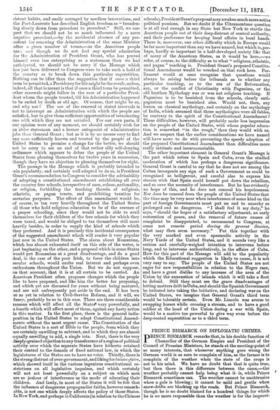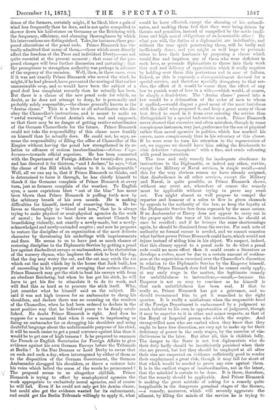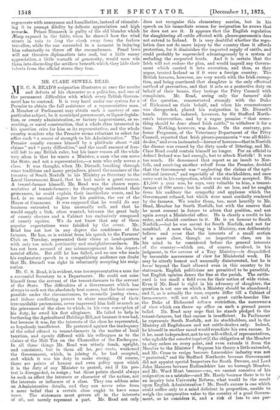PRINCE BISMARCK ON DIPLOMATIC CRIMES. PRINCE BISMARCK remarks that, in
his double function of
PRINCE
of the-German • Empire and President of the Council of Prussian Ministers, he stands at the meeting-point of so many interests, that whenever anything goes wrong the German world is as sure • to complain of him, as the farmer is to complain of the weather when the state of the crops is not to his mind. We have no doubt that that is quite true, but then there is this difference between the cases,—the weather probably cannot help being what • it is, while Prince Bismarck sometimes ean. The weather cannot be unobtrusive when a gale is blowing ; it cannot be mild and gentle when snow-drifts are blocking up the roads. But Prince Bismarck, though he is no doubt blamed for a hundred things for which he is no more responsible than the weather is for the improvi-
dence of the farmers, certainly might, if he liked, blow a gale of wind less frequently than he does, and is not quite compelled to shower down his hail-stones on Germany or the Reichstag with the frequency, efficiency, and alarming thoroughness by which his interventions are distinguished. Take, for instance, these pro - posed alterations of the penal code. Prince Bismarck has vir- tually admitted that many of them,—those which more directly affect the freedom of the Press and individual liberty,—are not quite essential at the present moment ; that some of the pro- posed changes will bear further discussion and maturing ; that the promptness to strengthen authority was perhaps in advance of the urgency of the occasion. Well, then, in these cases, even if it was not exactly Prince Bismarck who sowed the wind, he might, if he had pleased, have prevented the sowing of that rather unseasonable crop, and so would have been the subject of a good deal less complaint recently than he actually has been. But there is a clause of the new penal code for which, no doubt, as he does not attempt to deny, he is personally and probably solely responsible,—the clause generally known as the "Arnim clause." This is a blow at all subordinates who dis- obey the Chancellor's instructions, and is meant to make an " awful warning" of Count Arnim's sins, real and supposed, so that there may be no danger of getting restive subordinates of the German Chancellerie for the future. Prince Bismarck could not take the responsibility of this clause more frankly on himself than he actually does. He could not, he says, as- sume the responsibility of filling the office of Chancellor of the Empire without having the penal law strengthened in its re- lation to offences of serious insubordination—c/o/oser Unge- horsam—towards official superiors. He has been connected with the Department of Foreign Affairs for twenty-five years, and has directed it for thirteen, "and I declare," he says, " that the clause of the Bill which relates to it is indispensable." Well, all we can say is, that if Prince Bismarck so thinks, and is determined to force it through, he has chiefly himself to thank if the Germans complain of Prince Bismarck at every turn, just as farmers complain of the weather. To English eyes, a more capricious blast " out of the blue " has never been blown than Prince Bismarck is puffing forth now by the arbitrary breath of his own mouth. He is making difficulties for himself, instead of removing them. He be- lieves so thoroughly in " blood and iron," that he is always trying to make physical or semi-physical agencies do the work of moral ; he hopes to beat down an ancient Church by brandishing violently, not exactly a newly-made, but a newly- acknowledged and newly-extended sceptre ; and now he proposes to restore the discipline of an organisation of the most delicate character by threatening his underlings with imprisonments and fines. He seems to us to have just as much chance of restoring discipline to the Diplomatic Service by getting a penal law against disobedient envoys or ambassadors, as the rhetorician of the nursery rhyme, who implores the stick to beat the dog, that the dog may worry the cat, and the cat may catch the rat which eat the malt which lay in the house that Jack built, has of succeeding in his purpose of avenging that serious offence. Prince Bismarck may get the stick to beat his envoys with from an obedient Reichstag, but when he has got his stick, he will have to get his fire to stimulate it to do its work, and will find this as hard as to procure the stick itself. Why, just consider what he himself said on the subject. He said it was not high treason for an ambassador to shrug his shoulders, and declare there was no counting on the resolves of the Chancellor, when he had been ordered to declare in the most positive way that he believed peace to be firmly estab- lished. No doubt Prince Bismarck is right. And does he suppose for a moment that when it comes to imprisoning or fining an ambassador for so shrugging his shoulders and using doubtful language about the unfathomable purposes of his chief, it will be much easier to get a penal sentence against him than it would be to get one of high treason ? Is he prepared to summon the French or English Secretaries for Foreign Affairs to give evidence against his own German Envoys before the Tribunals at Berlin ? Is the Due Decazes or Lord Derby to swear that on such and such a day, when interrogated by either of them as to the disposition of the German Government, the German Ambassador shrugged his shoulders, or threw a cadence into his voice which belied the sense of the words he pronounced ? The proposal seems to us altogether childish. Prince Bismarck is trying to effect by semi-physical agencies the work appropriate to exclusively moral agencies, and of course he will fail. Even if he could not only get his Arnim clause, but could also get the evidence wanted for its enforcement, and could get the Berlin Tribunals willingly to apply it, what would he have effected, except the shaming of his subordi- nates, and making them feel that they were being driven by threats and penalties, instead of compelled by the noble tradi- tions and high moral obligations of an honourable office l Do what you will, the duties of a diplomatist are indefinable, and without the true spirit penetrating them, will be badly and inefficiently done ; and you might as well hope to persuade wives to love their husbands by proposing a clause which would fine and imprison any of them who were deficient in such love, as persuade diplomatists to throw into their work that zeal and delicacy of appreciation which it really requires by holding over them this portentous rod in case of failure. Indeed, as this is expressly a class-punishment devised for a special service, and therefore specially derogatory to that ser- vice, the effect of it would be worse than the effect of any law to punish want of love in a wife,—which would, of course, be simply a dead-letter. The ' Arnim clause' passed into a law would be a defamation of the order of men to whom it applied,—would disgust a good many of the most fastidious with the chief who proposed it, and keep a great many of those best fitted to excel in it from ever entering the service thus distinguished by a special bad-service mark. Prince Bismarck never showed that excessive and often mistaken, though in some conspicuous instances, very just, preference for the use of physical rather than moral agencies in politics, which has marked his career, more conspicuously than in his advocacy of this clause. If he were ever to turn his attention to the regeneration of art, we suppose we should have him asking the Reiclismth to visit defective atmosphere' with a fine, and crude colouring with penal incarceration.
The true and only remedy for inadequate obedience to instructions in the Diplomatic, or indeed any other, service, except the Military or Naval services, is simple recall,—and this for the very obvious reason we have already assigned, that disobedience in all other services, except the Military and Naval, is quite possible, as Prince Bismarck shows, without any overt act, wherefore of course the remedy must be applicable without trying to prove any overt act. You might almost as well propose to compel the repartee and humour of a salon to flow in given channels by appeals to the authority of the law, as keep the loyalty of the Diplomatic Service free from reproach by the same means. If an Ambassador or Envoy does not appear to carry out in the proper spirit the tenor of his instructions, he should at once be recalled ; and if he betrays the same shortcomings again, he should be dismissed from the service. For such acts of authority no formal excuse is needed, and we cannot conceive what further power Prince Bismarck could have, which would not injure instead of aiding him in his object. We suspect, indeed, that this clumsy appeal to a penal code to do what a penal code could no more effect than it could create a literature or develope a cultus, must be due to a certain amount of restless- ness at the supervision exercised over the Chancellor's discretion in relation to the Diplomatic Service by the Emperor himself. Possibly Prince Bismark does feel that he cannot easily apply, at any early stage in the matter, the legitimate remedy for unfaithfulness to instructions,—recall,—because the Emperor is not so easy to convince as he himself is that such unfaithfulness has been real. If that be really so, Prince Bismarck has got a grievance, and we should recommend him to get it remedied in the right quarter. It is really a misfortune when the responsible head of the Foreign Department is embarrassed by a judgment so much inferior to his own in opportunities of judgment, though it may be superior to it in other and minor respects, as that of the Royal or Imperial person who wields the sceptre. And strong-willed men who are curbed when they know that they ought to have free discretion, are very apt to make up for their deficiency of power in the early stages, by the exercise of yin. dictiveness in the later. But after all, this is childish folly. The danger to the State is not lest diplomatists who do their duty badly should be insufficiently punished when their sins are proved, but lest they should be employed at all after their sins are suspected on evidence sufficiently good to render their employment a great risk, though it may fall far short of that which would be needed to prove any case against them. It is in the earliest stages of insubordination, not in the latest, that the mischief is certain to be done. It is there, therefore, that the remedy should be applicable. And Prince Bismarck is making the great mistake of asking for a remedy quite inapplicable in the dangerous germinal stages of the disease, —a remedy, moreover, which will severely aggravate the ailment, by filling the minds of the service he is trying to- regenerate with annoyance and humiliation, instead of stimulat- ing it to prompt fidelity by delicate appreciation and high rewards. Prince Bismarck is guilty of the old blunder which Mop exposed in the fable, when he showed how the wind strove in vain to drag the cloak away from the forlorn traveller, while the sun succeeded in a moment in inducing him voluntarily to throw off the encumbrance. Penal laws will not threaten diplomatists into zeal, but a little sunny appreciation, a little -warmth of generosity, would soon win them into discarding the artifices beneath which they hide their talents from the official storm they fear.








































 Previous page
Previous page